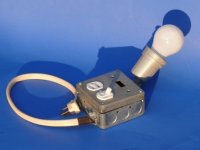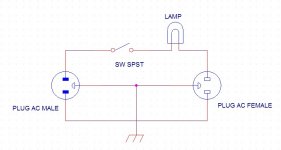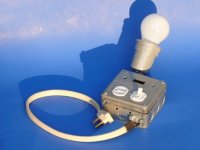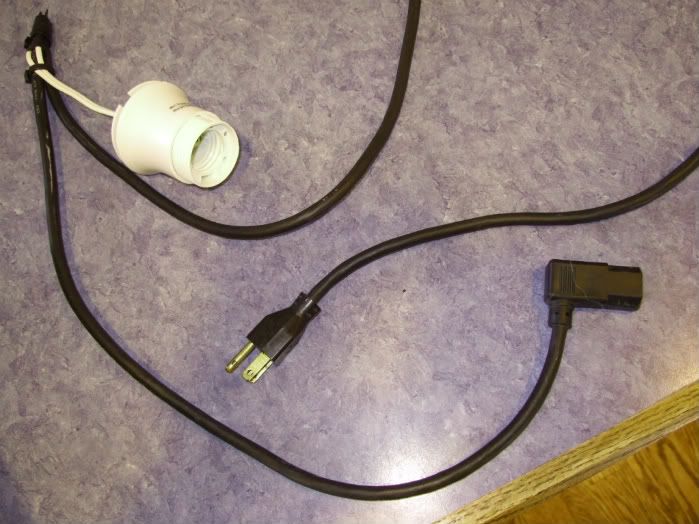Rangefinder writes that "Dim Bulb Tester" is more historically accurate. see post #38
A "Light Bulb Tester" is often suggested when testing a new or modified circuit. But it often takes much searching to find the tester. So below is a schematic and photos. I built the tester out of spare parts. I'll let others clarify using the tester.
A "Light Bulb Tester" is often suggested when testing a new or modified circuit. But it often takes much searching to find the tester. So below is a schematic and photos. I built the tester out of spare parts. I'll let others clarify using the tester.
Attachments
Last edited:
Also see this thread for links and information:
http://www.diyaudio.com/forums/power-supplies/164729-mains-light-bulb-tester.html
http://www.diyaudio.com/forums/power-supplies/164729-mains-light-bulb-tester.html
In another thread simon7000 wrote this about using a light bulb tester to repair a solid-state amplifier:
No, but you can usually repair it without one (a manual).
I don't know your level of expertise so I will outline the entire fix it blind procedure for a solid state audio power amplifier built with discrete semiconductors.
It has a linear power supply, so you don't need to start there.
You will need to build a light bulb box to test your work as you go. This should be a 40W or so light bulb in series with the ac power line.
The next step is to make sure all the fuses are good and then power up the speaker through the light bulb.
The bulb should flash bright when it is first powered up, then settle to a dim glow.
If it stays bright then remove all of the output transistors and check then for dead shorts. If they are good reinstall them and check the driver transistors. After you replace the bad transistor(s) you can try powering it up again. If that doesn't do it it you should check the input transistors again for short or open.
To test the transistors all you need is an ohm meter. You will need to do all six possible connections. All the good transistors will measure the same as their like types (NPN or PNP) the bad output transistors normally show a dead short, inputs often will have an open lead.
If all the outputs, drivers and inputs are good, but it still isn't right, replace the current sources to the input stage.
Most likely is one bad output transistor. If the unit has a protection relay the light bulb will flash and go dim but the relay will not close. Repair is the same.
No, but you can usually repair it without one (a manual).
I don't know your level of expertise so I will outline the entire fix it blind procedure for a solid state audio power amplifier built with discrete semiconductors.
It has a linear power supply, so you don't need to start there.
You will need to build a light bulb box to test your work as you go. This should be a 40W or so light bulb in series with the ac power line.
The next step is to make sure all the fuses are good and then power up the speaker through the light bulb.
The bulb should flash bright when it is first powered up, then settle to a dim glow.
If it stays bright then remove all of the output transistors and check then for dead shorts. If they are good reinstall them and check the driver transistors. After you replace the bad transistor(s) you can try powering it up again. If that doesn't do it it you should check the input transistors again for short or open.
To test the transistors all you need is an ohm meter. You will need to do all six possible connections. All the good transistors will measure the same as their like types (NPN or PNP) the bad output transistors normally show a dead short, inputs often will have an open lead.
If all the outputs, drivers and inputs are good, but it still isn't right, replace the current sources to the input stage.
Most likely is one bad output transistor. If the unit has a protection relay the light bulb will flash and go dim but the relay will not close. Repair is the same.
yes, this is shown in Decibel Dungeon.Also known as a 'lamp limiter'. In addition to the on/off switch, it can be useful to add a switch to bypass (i.e. short out) the lamp. Only use this when you are confident that the equipment being tested works OK.
But, I think the switch must be push and hold to make. Otherwise it could accidentally be left ON, defeating the tester.
Very useful addition if it can be made foolproof. I have never added either switch, because I know I will forget. I do realise the switches make the tester much more usable, I'll just need to find a suitable switch.
Label it carefully. Double-check before switching on (as you should anyway). Push and hold might require three hands!AndrewT said:But, I think the switch must be push and hold to make. Otherwise it could accidentally be left ON, defeating the tester.
Why subscribe to a magazine when information is free on the web?
Why subscribe to a magazine when information is free on the web?
1 There is not only stupid stuff but also some dangerous answers on the web.
2 A magazine gives you information that is reviewed and corrected.
3 You can save a magazine and refer to it later, web pages fade away.
4 What you store on your computer often gets lost with time, upgrades and crashes.
5 Haven't you noticed even on the web when someone wants real information it comes from printed material.
6 Where do you think most of these projects started? Shunt regulators are a good example.
7 The web isn't free, you pay for service, advertisements pay for some, and your contribution also is needed.
1 - agreed
2 - if only that were true - magazine articles can contain errors - it is astonishing how confidently some people can write about subjects which they are ignorant of - I am not talking about the minor errors which all authors make or debatable points, but genuine profound ignorance of a subject
3 - agreed
4 - maybe, depends on backups and compatibility (avoid Microsoft formats if you can!)
5 - depends on what you mean by real information - if it is old information then it is bound to be printed as the web has not been around very long
6 - ?
7 - agreed, but if you can filter out the nonsense the web is generally better value for money
Having said all that, I sometimes buy magazines!
2 - if only that were true - magazine articles can contain errors - it is astonishing how confidently some people can write about subjects which they are ignorant of - I am not talking about the minor errors which all authors make or debatable points, but genuine profound ignorance of a subject
3 - agreed
4 - maybe, depends on backups and compatibility (avoid Microsoft formats if you can!)
5 - depends on what you mean by real information - if it is old information then it is bound to be printed as the web has not been around very long
6 - ?
7 - agreed, but if you can filter out the nonsense the web is generally better value for money
Having said all that, I sometimes buy magazines!
2 - if only that were true - magazine articles can contain errors - it is astonishing how confidently some people can write about subjects which they are ignorant of - I am not talking about the minor errors which all authors make or debatable points, but genuine profound ignorance of a subject
5 - depends on what you mean by real information - if it is old information then it is bound to be printed as the web has not been around very long
6 - ?
7 - agreed, but if you can filter out the nonsense the web is generally better value for money
Having said all that, I sometimes buy magazines!
2 Letters to the editor tend to correct errors, web threads often contain "corrections" that just ain't.
5 The old stuff still counts. Try the Radiotron Designers Handbook a bit big for a PDF.
6 It is interesting to watch how a single article starts a lot of web wanna be's! Of course if you don't subscribe you don't know that.
7 Let me know how much you spend on stuff that turns out not so good or even doesn't work, gets blown up etc.
I wasn't talking about rules, but safety. Double insulation rules are difficult for DIY, so grounding external metal is the usual option. The lamp limiter in post 15 appears to show a switch with a metal frame connected in parallel with the lamp? If so, how is the switch frame grounded? It appears to depend for safety on the insulation within the switch.
- Home
- Amplifiers
- Power Supplies
- Light Bulb Tester






